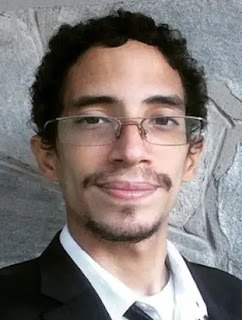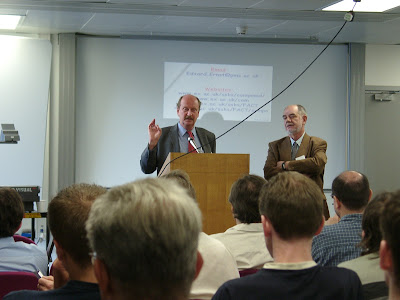THE STUDY CIRCLE FOR THE CRITICAL EVALUATION OF PSEUDOSCIENCE AND THE
PARANORMAL
Tim Trachet, Bach in Mathematics and Philosophy at the Vrije Universiteit Brussel, former reporter at the Flemish Association of Radio and Television (VRT), honorary and founding president of SKEPP and vice-president of the European Council of Skeptical Organisations (ECSO).
On June 9, 1990, the association SKEPP (Study
Circle for the Critical Evaluation of Pseudosciences and the Paranormal) was
founded in Belgium. Formally, SKEPP had thirteen (yes!) founding members. In
fact, only twelve of them signed the memorandum of association that day. The
thirteenth didn't show up because... His house had been struck by lightning.
The late Flemish physician and professor Wim Betz (right) and his British-German colleague Edzard Ernsten, both famous skeptics of pseudo-medical therapies, at a European conference in London, 2003.
How did it come to this? Based on my personal
experience, I would say... which was Wernher von Braun's fault. Not because the
rocket developed by this German caused quite a few casualties during World War
II, but because after that war, this rocket led to a rapid development of space
travel, the undisputed highlight being manned flights to the moon. This led to
unprecedented optimism. When the first man landed on the moon in 1969, experts
predicted that the first man would land on Mars around 1980, at least before
the end of the century. Anything seemed possible. And if humans could visit
other planets in the foreseeable future, it seemed obvious to many that we
would also receive occasional visits from aliens. Books about UFOs and extraterrestrial
civilizations had a large circulation. Authors such as Erich von Däniken broke
through with their books on the influence of aliens on cultures of the past and
television was filled with series such as UFO and The Invaders,
not to mention Star Trek.
Space travel also strongly stimulated interest
in astronomy among young people. The Association of Astronomy in Belgium (VVS),
founded in 1944, saw a veritable influx of young amateur astronomers, including
the author of this article. Through the VVS magazine they not only received
useful information about astronomy, but also some warnings about
pseudosciences. The editor-in-chief continually pointed out in the magazine the
"new superstition" about UFOs and extraterrestrials. In reality, he
said, there were no UFOs, and in any case, astronomers did not see any UFOs.
Most UFOs were reported by inexperienced observers who had never heard of a
sunrise, had never seen a bright meteor, had no idea what the planet Venus
looked like, or didn't know that the moon can appear very large when it's low
on the horizon. The books of von Däniken and others were full of nonsense. It
was a hoax, or at least – the word was already mentioned then – a
pseudoscience.
At the same time, the magazine lashed out at
another kind of nonsense: astrology. It is nothing new that astronomers
considered this prediction based on the position of celestial bodies to be
completely absurd. Two centuries earlier, the French astronomer and politician
Bailly called astrology "the greatest disease that has afflicted human
reason." The relative marginality in which astronomy found itself for
quite some time was broken during the golden 1960s thanks to the emerging
alternative movements. During the 1970s, interest increased, especially in the
media, and commercial exploitation of the "alternative" sector began.
People interested in science began to worry more and more about the nonsense
that was coming up. Some prominent members of the VVS made statements about it
on occasion in the press.
In 1976, the American magazine The Humanist
published a statement by more than a hundred scientists and philosophers
against astrology. A copy of the statement was published in the VVS magazine .
Soon after, the philosopher Paul Kurtz, one of the promoters of the
declaration, would create CSICOP, the current Committee for Skeptical Inquiry
(CSI) in the United States.
That same year, a professor created a working
group within the VVS to critically examine pseudosciences. Several young people
(including the author) immediately joined in. The Prometheus group, as it was
called for obvious reasons, would carry out intense study work for more than
ten years and at the same time inform the general public through articles,
pamphlets, lectures and debates with "pseudos" (sometimes also on
television).
In the early years it was only about
astrology, UFOs and related topics, such as von Däniken's theories. Throughout
the 1980s, the group took on more and more work and focused on pseudosciences
other than those that were considered peripheral domains of astronomy. For
example, parapsychology and creationism.
CSICOP and its magazine Skeptical Inquirer
had become world famous. Paul Kurtz and his employees regularly visited Europe,
organized meetings, and encouraged like-minded people to join. This is how the
Skepsis Foundation was founded in 1988 in the Netherlands and shortly
afterwards the GWUP in Germany. Belgium already had a skeptical organization,
even the oldest in the world! Since 1947 there was a Belgian Committee for the
Scientific Investigation of Paranormal Phenomena (known as the "Para
Committee"). Formally it was a bilingual organization (in Belgium it has
two official languages: Dutch – or Flemish – in the north and French in the
south of the country). In practice, the majority of the members and all the
leaders of the Para Committee were French-speaking.
The Prometheus group then began holding
meetings with other interested and skeptical-minded people. The contacts thus
established gave rise to an informal and larger group, in which psychologists
and doctors also participated. The arrival of doctors ensured that medical
problems were now treated as well. Among them was Willem (Wim) Betz, a professor of
general medicine at the University of Brussels who, as a general practitioner,
had witnessed the detrimental influence of alternative medicine on desperate
patients. Betz seriously considered the possibility of founding an association
against quackery, following the Dutch example. However, a group with only
skeptical doctors would have been very limited. A group was then created to
deal with pseudosciences in general.
Skepp: scientifically approved
What should happen now? Initially, it was
thought to join the Para Committee collectively, some of whom were already
members. But the Para Committee itself finally thought it would be better to
have a separate Dutch-speaking association. The decision was made. The name
SKEPP was soon accepted.
Managing the young association at first was
not an easy task, especially since resources were very limited. SKEPP lived –
and always lives – solely on the contributions of its members. Fortunately, it
seems that many people are willing to contribute generously to an association
that, apart from the magazine and the occasional conference, has little to
offer its members. Therefore, members understand that SKEPP is there primarily
to achieve its goals and that this requires money. It's not a lot of money, especially
since all the work within the association is purely voluntary.
SKEPP has gained a lot of support and fame
since its founding. The number of members has now grown to more than a
thousand. However, a large number of members is not a goal in itself. When it
comes to active contributors, SKEPP is still short on staff. We are especially
lacking in "experts", people who have the courage and competence to
study strange and controversial dossiers. This may be because the number of
scientists and academics within SKEPP has not increased as much as the total
number of members.
Magazine Wonder en is gheen Wonder [Wonder and is no Wonder] 2022
Magazine Skepp 2023
If we compare the texts that SKEPP has
published through its magazine and website, we see the importance that medical
topics have had in twenty years of operation. First of all, everything related
to alternative medicine, in which Wim Betz – sadly deceased – has become an
international authority. But all sorts of health claims, such as the supposed
dangers of vaccination and mobile phone radiation, have also not escaped our
attention. Surprising attention is paid to controversial psychological
practices, such as psychoanalysis and modern human resource methods.
Creationism also received considerable
attention. Belgium has relatively few opponents of the theory of evolution, but
they are numerous among the Muslim population. On the other hand, less
attention is paid to parapsychology and the occult than one might initially
have thought. The investigation of the paranormal was limited to tests
conducted by Marc Braem on clairvoyants, astrologers and astral travelers. This
has rarely happened in recent years. "Psychics" aren't always
enthusiastic about being tested by skeptics, though they can win a big cash
prize if the test is positive. In recent years, a lot of attention has been
paid to conspiracy theories and bizarre opinions spread on the Internet. How
could it be otherwise?
Finally, the presence of quite a few
philosophers in our association has resulted in numerous conferences and
articles with philosophical reflections, perhaps more than in other comparable
associations.
The highlight in the media
was our actions around a bill (1998-1999) that sought to implement certain
alternative medicines. Wim Betz harshly and substantially criticised this
proposal by the Belgian Minister of Health. On the other hand, an attack by this
minister on the alleged bias of scientists towards his bill was responded to
with an open letter in the press. This led to a bitter television debate with
the minister. All this has contributed
to the fact that the recognition procedure provided for in the law has been
tightened to such an extent that there is still no recognition more than twenty
years after its approval...
This was perhaps our "finest hour",
along with the "collective suicide action", in which members and
supporters of the SKEPP took homeopathic medicines en masse in front of the
cameras, of course without the slightest consequence. An event that became the
first point of television news. This "suicidal action" was later
adopted by other skeptical societies around the world.
"Collective suicide action" in which Skepp supporters massively ingested a homeopathic remedy with arsenic and snake venom but extremely diluted: ten times in water thirty times in a row, in Brussels, 2011.
SKEPP has also quietly intervened on occasion
to stop serious media outlets, such as public radio and television, from paying
uncritical attention to this kind of nonsense. Often with favorable results.
The mere fact that we exist is positive:
people know us. Our website is widely consulted. Journalists know where to turn
to get a critical response to some strange news. Students ask us for help in
completing a capstone project. Victims of charlatans, sometimes desperately,
ask us for advice.
In short, we can say of Skepp what Voltaire
said of God: if he did not exist, he would have to be invented.
Although... We really hope that we can abolish it as quickly as possible, if it
turns out that it is no longer necessary. Unfortunately, that won't happen
anytime soon, maybe ever. But as long as society is harmed by nonsense and
deception, people will be needed to denounce it. There is still a lot of work
to be done.
(Translation by Word of the Spanish article “BREVE HISTORIA DE SKEPP: EL CÍRCULO DE ESTUDIOS PARA LA EVALUACIÓN CRÍTICA DE LASPSEUDOCIENCIAS Y DEL PARANORMAL” and reviewed by M.A. Paz y Miño)
GO TO NEO-SKEPSIS # 16: SKEPTICISM IN THE WORLD (II)


































